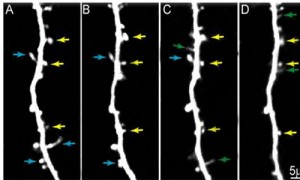
Time-lapse images show wiring changes (the growth and loss of spines) in the brain cells of a live mouse over multiple days.
In an alarming new study, researchers found that cocaine may rewire the brain and significantly alter decision-making after just one use. The study, performed by UC Berkley and UC San Francisco’s Ernest Gallo Clinic and Research Center, found that “cocaine can speedily rewire high-level brain circuits that support learning, memory and decision-making.” The study also revealed new insight into the role of the brain’s frontal lobe when it comes to drug-seeking behavior. This discovery is important in understanding addiction and its treatment options.
The frontal lobe is the part of the brain that controls memory and decision-making. The researches introduced cocaine to live mice and found that after just one dose there was “substantial growth of new dendritic spines, which are tiny, twig-like structures that connect neurons and form the nodes of the brain’s circuit wiring.” The new spines, the researchers explained, is what rewires the brain to seek cocaine and override other priorities.
The researches found that the changes in the mice were not just evident in the brain scans, but their behavior changed as well. Prior to being introduced to cocaine, the mice were given the choice of two chambers, each with a different scent and design. Each mice selected a preference between the two chambers. They were then given a dose of cocaine and put in the chamber they did not prefer. Their presumed drug-seeking behavior was evident when they were placed back in the chambers without any cocaine and the mice overwhelmingly chose to be in the chamber that was previously not the one they preferred. The mice who had the most obvious change in preference for the chamber associated with cocaine also revealed in the brain scan to have grown the most new dendritic spines.
There have been similar studies in the past that have shown how long-term use of the drug can cause such rewiring, and we’ve known for a long time that repeated use of drugs causes drug-seeking behavior to dominate the brain’s attention and decision-making. But it is disturbing to see such evident neurological changes after just one dose of cocaine. The good news, as the researchers explained, is that the brain regularly grows and loses dendritic spines, so there is the potential for the brain to return to normal and for recovery.


